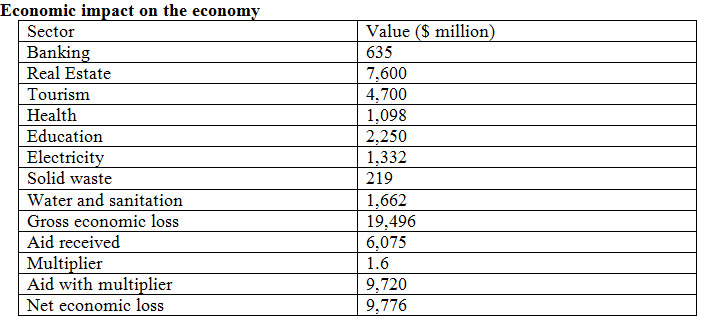Net economic loss due to
Syrian crisis: $9.8 billion
InfoPro book wraps up the repercussions on major sectors
| Share |
|

|
|

|
|
|
|
The net impact of the Syrian crisis has cost Lebanon’s most productive sectors $9.8 billion, according to a detailed study published by InfoPro on Tuesday.
‘Economic Impact of the Syrian Crisis on Lebanon’ compares the current economic situation with the period prior to the crisis, based on surveys undertaken by InfoPro, as well as more than 100 publications and studies, expert analyses and simulations.
Unemployment levels almost doubled to reach 18 percent, said Jennifer Abumrad, Research Manager at InfoPro. The majority of the Syrian refugee workforce, which hovers at 384,000, is mostly low-skilled laborers.
The book details the economic impact on productive sectors as well as the country’s infrastructure. For example, it notes a drop in exports and an increased cost of transportation. Bank deposits increased but recorded low growth rates and slow profits.
Tourist arrivals, room rates and tourist spending also declined. Construction permits and sales transactions dropped, as diaspora and foreigners shied away from purchasing property. Over 132,000 properties remain unsold.
Wealthy Syrians became one of the largest groups of foreign buyers, while the poor pushed up the rental market.
Demand for health services rose 40 percent while access to hospitals became more difficult.
Syrian students now make up half of the student body at public schools, causing a dip in enrollment rates of local students and a deterioration of the quality of education.
Electricity consumption jumped 25 percent. People are paying electricity bills on behalf of Syrians who get electricity for free, said Charles Arbid, Chairman of the Economic and Social Council.
Solid waste increased 30 percent, causing some facilities to reach capacity. Water quality has deteriorated and resources have depleted.
Although the Syrian crisis has had an undeniable impact locally, experts offered suggestions. For instance, Arbid said that the government should make an effort to attract non-Arab tourists, regardless of the presence of refugees.
Emmanuel Gignac, Deputy Representative of UNHCR, noted that the government needs a strategy for the return of Syrians, as experience with refugee populations in other countries showed that this scenario might take many years.
Haneen Sayed, Program Leader at The World Bank said: “The biggest challenge going forward is in the area of job creation. The solution is by creating jobs for everyone, taking us back to the issue of how to improve economic growth.”
Gilbert Doumit, Managing Partner at Beyond Reform and Development, a consultancy firm, noted that the country had many longstanding problems before the Syrian crisis erupted.
“The economic model is not sustainable,” he said. “When the refugee crisis erupted, we found someone to blame for our other problems.”

![]()
Reported by Yassmine Alieh
Date Posted: Jun 13, 2018
| Share |
|

|
|

|
|
|
|